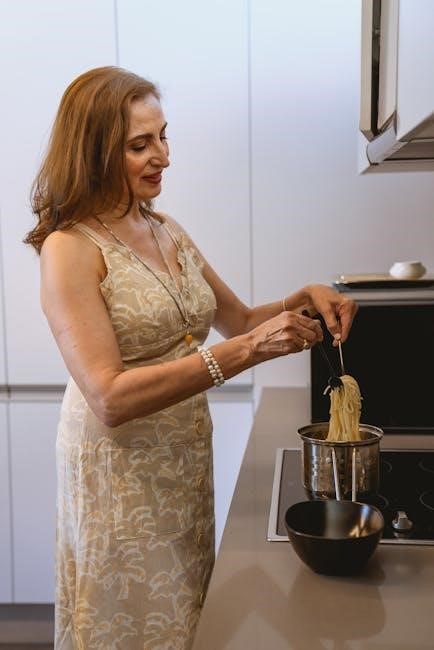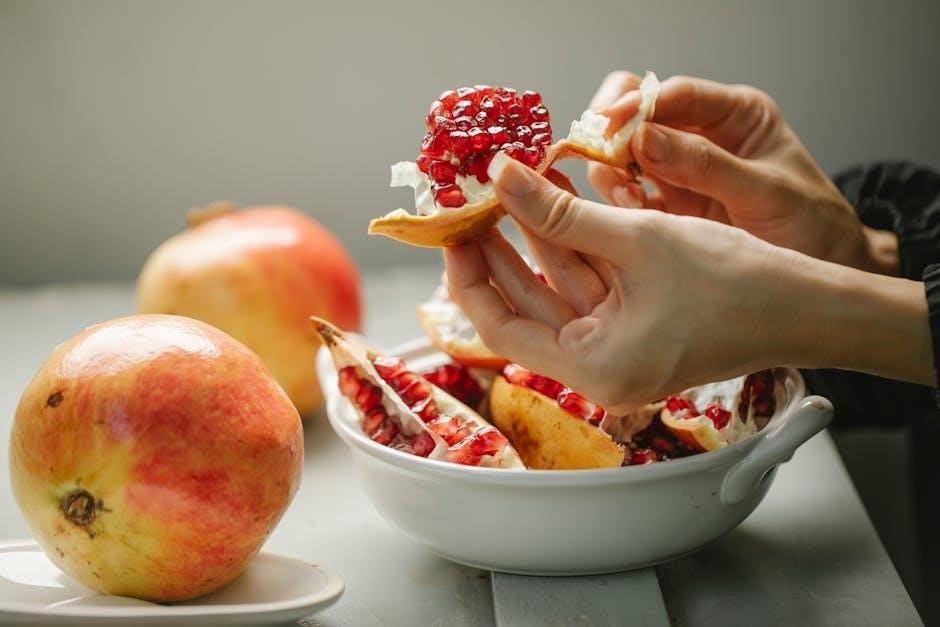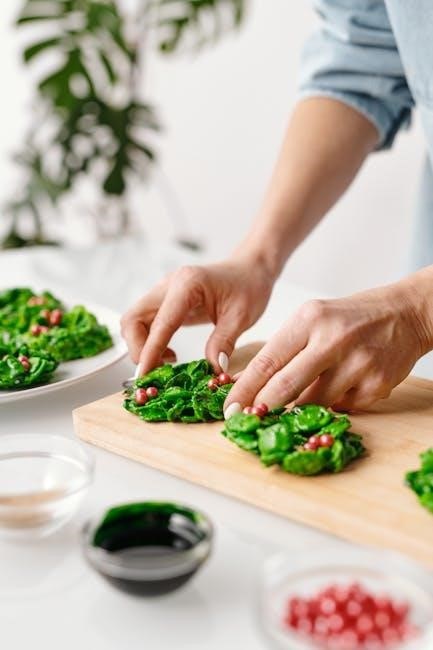pip preparing food example answers pdf
1.1 Overview of Personal Independence Payment (PIP)
PIP assesses daily living and mobility needs, with food preparation being a key activity. Eligibility depends on the ability to perform tasks like cooking and meal prep safely.
PIP is a benefit for individuals aged 16-64 with a long-term health condition or disability. It assesses daily living and mobility needs, focusing on tasks like preparing food, washing, and dressing. The ability to perform these activities safely and effectively determines eligibility. Food preparation is a key area, with challenges such as cooking, opening packaging, and managing hazards often impacting claims. Understanding PIP criteria is essential for successful applications.
1.2 Importance of Preparing Food in PIP Assessments
Preparing food is a fundamental daily living skill assessed in PIP claims. It evaluates ability to perform tasks like cooking, peeling, and chopping safely. Claimants must demonstrate capacity to manage without significant help or risk. This activity highlights independence levels, impacting eligibility for benefits. Challenges in food preparation often reveal broader difficulties in daily living, making it a critical focus during assessments.
1.3 Purpose of Example Answers in PIP Applications
Example answers in PIP applications provide clarity and guidance for claimants preparing food questions. They illustrate how to describe challenges, such as difficulties with peeling, chopping, or using appliances. These examples help applicants understand what to include, ensuring their responses are detailed and relevant. By aligning answers with PIP criteria, claimants can effectively demonstrate their needs and strengthen their case for support.

Understanding PIP Criteria for Preparing Food
Understanding PIP criteria for preparing food involves assessing ability to perform tasks like peeling, chopping, and cooking safely. It evaluates daily living challenges and needs for support.
2.1 Definition of Preparing Food in the Context of PIP
Preparing food, in PIP terms, involves tasks like peeling, chopping, opening packaging, and cooking safely. It assesses ability to make a simple meal, considering physical or cognitive challenges. Activities include using appliances, handling utensils, and managing hot liquids without risking harm. This definition focuses on independence and safety, key factors in determining eligibility for support through PIP.
2.2 Key Activities Assessed in Food Preparation
Key activities include peeling, chopping, opening packaging, and safely using appliances like microwaves or cookers. Assessors evaluate the ability to handle utensils, manage hot liquids, and prepare a simple meal. Cognitive challenges, such as following recipes or remembering steps, are also considered. Safety awareness, like avoiding burns or cuts, is crucial. These tasks highlight independence levels and any need for assistance, directly impacting PIP eligibility decisions.
2.3 How Preparing Food Impacts Eligibility for PIP
Preparing food significantly influences PIP eligibility as it reflects daily living independence. Inability to perform tasks like cooking or handling utensils safely can indicate a higher need for assistance. Assessors evaluate whether claimants require help, supervision, or cannot prepare food at all. This directly affects scoring and determines the level of benefit awarded, emphasizing the importance of accurately documenting these challenges in PIP applications.

Common Challenges in Preparing Food for PIP Assessments
Challenges include physical difficulties like handling hot objects or sharp tools, cognitive issues affecting meal planning, and safety risks such as unsupervised cooking.
3.1 Physical Difficulties in Food Preparation
Physical challenges may include dexterity issues, strength limitations, or mobility problems. These can hinder tasks like chopping, opening packaging, or safely handling hot items. Conditions like arthritis or chronic pain may make cooking difficult, while mobility impairments can limit access to kitchen tools. Safety risks, such as burns from hot surfaces or sharp objects, may also arise, requiring adaptive strategies or assistance to manage effectively.
3.2 Cognitive or Mental Barriers to Preparing Food
Cognitive or mental health challenges can significantly impact food preparation. Conditions like memory loss, ADHD, or anxiety may cause forgetfulness, difficulty following recipes, or overwhelming stress in the kitchen. Depression can reduce motivation, leading to meal skipping, while severe anxiety might prevent using appliances or handling sharp objects safely. These barriers can impair daily living skills, necessitating support or accommodations to maintain independence in meal prep.
3.3 Safety Risks and Hazards in Food Preparation
Physical disabilities or impairments can create safety risks while preparing food, such as burns from hot surfaces or cuts from sharp objects. Vision or dexterity issues may increase accidents, while memory problems could lead to forgotten cooking tasks, causing fires. Assessors evaluate whether an individual can safely manage these risks, often requiring supervision or assistive devices to ensure their safety during meal preparation activities.

Strategies for Claiming PIP for Food Preparation Difficulties

Document daily struggles, highlight safety risks, and provide evidence of assistance needed. Emphasize how difficulties impact independence and daily living to strengthen your PIP claim effectively.

4.1 Documenting Daily Struggles with Food Preparation
Documenting daily struggles with food preparation is crucial for PIP claims. Keep a detailed record of difficulties, such as challenges with opening packaging, chopping, or cooking safely. Note any physical or cognitive barriers that prevent you from preparing meals independently. Highlight instances where assistance is needed or safety risks arise, as this evidence strengthens your case and demonstrates the impact on your daily living abilities.
4.2 Providing Evidence of Assistance Needed
Providing evidence of assistance needed is vital for PIP claims. Include details like requiring help from caregivers or using assistive devices for food preparation. Specify tasks you cannot perform independently, such as chopping or cooking, and explain how assistance enables you to complete them. This evidence demonstrates the level of support required, strengthening your eligibility for PIP benefits.
4.3 Highlighting the Impact on Daily Living
Highlighting how food preparation difficulties affect daily living is crucial for PIP claims. Explain how challenges with cooking impact nutrition, health, and well-being. Describe reliance on others or dependence on pre-prepared meals. Emphasize how this limits independence, causing feelings of dependence or isolation. Linking these impacts to your condition strengthens your case, showing how difficulties with food preparation significantly affect your quality of life and eligibility for support.

Evidence and Documentation for PIP Claims
Evidence and documentation are crucial for PIP food preparation claims. Include medical records, caregiver testimonies, and examples of daily struggles. Photography or videos can support your case.
5.1 Importance of Medical Evidence in PIP Applications
Medical evidence is vital in PIP applications, providing proof of your condition’s impact on daily activities like food preparation. Include doctor’s letters, therapy reports, and assessments to validate your claims. This documentation helps demonstrate how your abilities are limited, supporting your eligibility for assistance. Specific examples, such as difficulty chopping or opening cans, strengthen your case.
5.2 Role of Caregiver Testimonies in Food Preparation Claims
Caregiver testimonies provide valuable insights into your daily struggles with food preparation. They can describe specific challenges, such as difficulty chopping vegetables or opening packaging, and highlight the frequency of assistance required. These testimonies add credibility to your claim, offering an objective perspective on your needs. Detailed accounts of safety concerns or reliance on others strengthen your case for PIP eligibility.
5.3 Using Photographic or Video Evidence
Photographic or video evidence can visually demonstrate your challenges in food preparation. Images of incomplete meals or difficulties with tasks like chopping or cooking can support your claim. Videos showing struggles with kitchen tools or safety risks provide tangible proof of your limitations. This evidence helps assessors understand your needs and can strengthen your case for PIP eligibility, especially when paired with written testimonies.
Example Answers for PIP Preparing Food Questions
Example answers detail struggles like, “I find peeling vegetables difficult due to hand pain,” or “I require assistance with cooking due to safety concerns.”
6.1 Sample Responses to Food Preparation Questions
Sample responses might include: “I struggle to chop vegetables due to arthritis,” or “I need help opening cans because of limited hand strength.” Another example: “I often burn food while cooking because of concentration issues.” These responses highlight specific difficulties and their impact on daily living. They provide clear examples of how conditions affect food preparation tasks, aiding assessors in understanding the need for support.
6.2 Tips for Framing Answers Effectively
When answering food preparation questions, be specific about your difficulties. Use “I” statements to describe your experiences, such as “I often struggle to chop vegetables due to pain.” Focus on how your condition impacts your ability to perform tasks safely and independently. Avoid vague terms and emphasize the frequency and severity of challenges. Clarity and honesty are key to ensuring assessors understand your needs fully.
6.3 Avoiding Common Mistakes in Responses
Avoid vague statements like “I struggle with cooking.” Instead, specify challenges, such as “I cannot chop vegetables due to hand pain.” Don’t omit details about needing help or safety risks, like “I rely on assistance to avoid burns.” Refrain from exaggerating abilities; honesty is crucial. Ensure your answers align with your daily experiences and clearly show how your condition impacts food preparation tasks, helping assessors understand your needs accurately.

Common Mistakes to Avoid in PIP Food Preparation Claims
Overstating abilities, omitting specific examples, and ignoring the need for assistance are common errors. Avoid vague descriptions and ensure responses reflect real-life challenges accurately.
7.1 Overstating or Understating Abilities
Overstating abilities may minimize perceived struggles, while understating can exaggerate limitations. Both risks misrepresenting true needs. Claimants must provide balanced, accurate descriptions of their food preparation capabilities and challenges. Avoid general statements; instead, focus on specific, recurring difficulties. For example, if cooking safely requires assistance or causes significant anxiety, clearly detail these barriers. Honest, detailed accounts ensure assessors understand the true impact on daily living and mobility.
7.2 Not Providing Specific Examples
Not providing specific examples can lead to misunderstandings or underrating the severity of difficulties. Vague statements like “I struggle with cooking” lack detail, making it hard for assessors to evaluate challenges accurately. Claimants should include concrete examples, such as frequency of difficulties, specific tasks that are hard, and how assistance is needed. This ensures a clear understanding of the impact on daily living and mobility, supporting a fair assessment.
7.3 Ignoring the Relevance of Assistance
Overlooking the role of assistance in food preparation can weaken a PIP claim. Failing to mention if help is needed, whether from others or devices, can lead assessors to underestimate challenges. It’s crucial to detail how often assistance is required, who provides it, and in what form, to accurately reflect dependency levels and support needs for daily tasks like cooking and meal preparation.

FAQs About PIP and Food Preparation
8.1 Can I Claim PIP if I Can Prepare Simple Meals?
PIP eligibility isn’t solely based on meal complexity but on the level of assistance or difficulty experienced. Simple meals may still qualify if challenges exist.
8.2 How Does the Use of Assistive Devices Affect Claims?
Assistive devices can support claims if they reduce independence. Their use highlights dependency on aids, impacting eligibility assessments for food preparation tasks.
8.3 What If I Can Prepare Food But Not Safely?
Unsafe food preparation, like handling hot items or sharp objects, can significantly affect PIP eligibility, as it indicates a need for supervision or assistance.
PIP eligibility isn’t solely determined by the ability to prepare simple meals but by the level of difficulty or assistance required. Even if you can make basic meals, challenges like safety risks, physical limitations, or the need for supervision can still qualify you for support. It’s essential to document any struggles or hazards encountered during food preparation to strengthen your claim.
The use of assistive devices, like adapted utensils or microwave trolleys, can support your PIP claim by demonstrating ongoing difficulties. While these tools enable basic tasks, they highlight the need for additional aids, which PIP considers. Documenting reliance on such devices emphasizes your challenges, even if you can perform tasks with assistance, reinforcing your eligibility for support.
If you can prepare food but not safely, this still impacts your PIP eligibility. Safety risks, such as handling hot pans or sharp objects, are considered. Even if you can perform tasks like chopping or cooking, inability to do so safely may indicate a need for supervision or assistance, which PIP assesses. Documenting these risks helps demonstrate the challenges you face in daily food preparation tasks.
Resources and Support for PIP Applicants
PIP applicants can access official guidance documents, seek support from charities, and engage with online forums for shared experiences, advice, and additional resources.
9.1 Official PIP Guidance Documents
Official PIP guidance documents are available on the UK Government’s website, providing detailed information on eligibility criteria, assessment processes, and evidence requirements. These resources include sample questions, descriptors, and scoring guidelines, helping applicants understand how food preparation difficulties are evaluated. They also outline the importance of medical evidence and caregiver testimonies in supporting claims, ensuring applicants can effectively prepare their cases for a successful outcome.
9.2 Charities and Organizations Offering PIP Support
Charities like Citizens Advice, Disability Rights UK, and the National Council for Voluntary Organisations provide guidance on PIP applications. These organizations offer free resources, workshops, and one-on-one support to help individuals understand eligibility criteria and gather evidence. They specialize in assisting with food preparation-related claims, ensuring applicants can effectively document their challenges and secure the support they need for daily living tasks.

9.3 Online Forums and Communities for PIP Applicants
Online forums like PIP Claims Forum, Benefits and Work, and Disability Support Group offer valuable insights and shared experiences. These platforms allow applicants to discuss challenges, share tips, and receive advice on navigating PIP applications. Many users focus on food preparation difficulties, providing examples of how to document struggles and evidence needs. These communities foster connection and practical support, helping applicants feel less isolated and more informed during the process.
10.1 Summary of Key Points
PIP assessments focus on daily living challenges, including food preparation. Understanding criteria, documenting struggles, and seeking support are crucial for a successful application.
Understanding PIP criteria for food preparation is crucial for successful applications. Key points include documenting daily struggles, highlighting the need for assistance, and showcasing the impact on daily living. Evidence, such as medical reports and caregiver testimonies, strengthens claims. Addressing safety risks and challenges in food preparation demonstrates eligibility. Providing clear, specific examples ensures assessors understand the extent of difficulties faced. This comprehensive approach maximizes the chances of a favorable outcome for PIP applicants.
10.2 Final Tips for Success in PIP Applications
Be thorough in documenting food preparation challenges, emphasizing how they impact daily life. Use specific examples to illustrate difficulties, and highlight any safety risks. Submit strong evidence, such as medical reports or caregiver testimonies, to support your claims. Avoid overstating or understating abilities, and clearly explain the need for assistance. Stay honest and detailed to ensure your application accurately reflects your situation and maximizes your chances of a positive outcome.
10.3 Encouragement for Applicants
Stay positive and thorough in your application process. Clearly document your experiences and seek support from caregivers or professionals. Remember, your voice matters, and accurately sharing your challenges is crucial. Celebrate small progress and know that your story is valid. Focus on your abilities and needs, and don’t hesitate to emphasize how food preparation impacts your daily life. You’re not alone in this journey—reach out for help and stay determined.